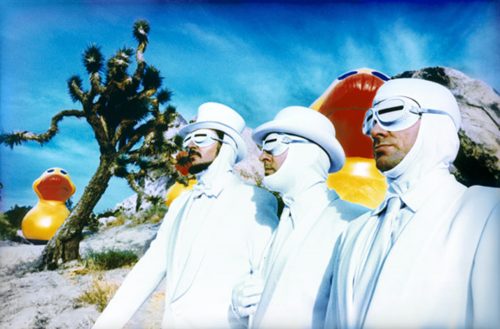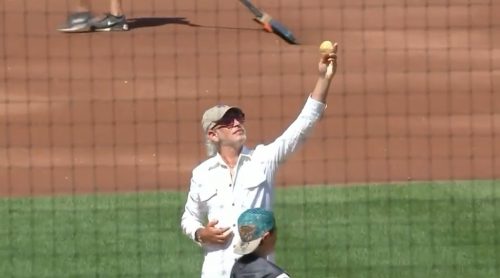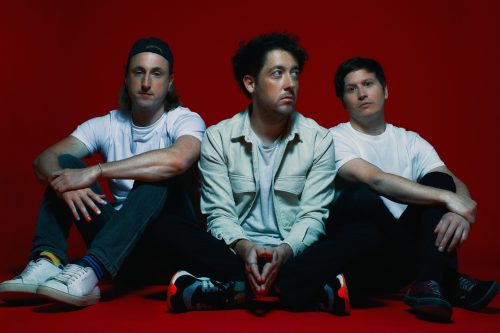It would be an understatement to say that Primus came out of left field. It’s more like the trio arrived from the stadium parking lot, showing up in a mid-1980s hard rock landscape as a funky alternative metal band driven more my bass and drums than guitar, playing songs like “Here Come the Bastards,” “Wynona’s Big Brown Beaver” and “Southbound Pachyderm” and embracing an off-beat slogan: “Primus sucks!”
“It was interesting that we didn’t get locked into one classification,” drummer Tim “Herb” Alexander says. “Even in the iTunes era, when they first created it they did all the genres, and someone told us that one of the engineers there was a Primus fan and he didn’t know where to put Primus, so he created a Primus category of music. … I thought it was a mistake I had made on my computer. Things are so different now, but when you loaded a song you had to classify what it was, and it gave you options like rock, country and pop, and Primus was one of them.”
Alexander has had three stints in Primus, which features Les Claypool on bass and vocals and Larry “Ler” LaLonde on guitar, and is the drummer on the popular ’90s albums “Sailing the Seas of Cheese,” “Pork Soda” and “Tales from the Punchbowl,” when wacky videos for their songs “Jerry Was a Race Car Driver” and “My Name Is Mud” were in rotation on MTV.
While his work in Primus and on the occasional side project, like Sound Cipher, a group that includes the sax player Skerik, is outside the mainstream, he says he never intended to forge a path away from the commercial part of the music industry.
“As time goes on, I started learning the things I do enjoy and the things I maybe want to not put a lot of time into,” he says. “That kind of led me to Primus, where we have lots of different things, we pull from a range of stuff, that’s kind of the element of the intention, going towards stuff that maybe influenced me or influenced us. In Primus, we have all the things that we’ve listened to over the years that have made us who we are. Those things kind of pop in and out and make it a direction.”
The past five years have been highlighted by everything from playing direct support on Slayer’s farewell tour to performing at the “South Park” 25th anniversary concert (the show’s opening theme song is by Primus). Before its show at the FM Kirby Center in Wilkes-Barre on Monday, May 6, Primus will end the Sessanta tour, a triple-headline tour alongside Puscifer and A Perfect Circle, at Forest Hills Stadium in Queens on Saturday, May 4.
Primus has been linked to another progressive trio, the Canadian band Rush, which Primus opened for on a tour in the ’90s. A few years ago, Primus played the 1977 Rush album “A Farewell to Kings” in its entirety on a tour dubbed “A Tribute to Kings.” The idea was conceived before COVID shut down concert tours — and before the 2020 death of Rush drummer Neil Peart. Rush’s Geddy Lee and Alex Lifeson watched the Toronto show on the “Tribute” tour from the side of the stage.
“Whenever I was playing it, I was thinking about Neil, for sure, and always thinking about me being a little teenager in the basement I was living in and listening to Rush albums and trying to figure out how to do them. And here I am 40 years later on stage playing these songs live, and knowing Rush as people and friends. That stuff was going through my head all the time. We weren’t trying to be a Rush cover band but do it the best that we could. So yeah, there was a lot of spiritual stuff going on doing that album on those tours, especially when Geddy and Alex were there.”
While Alexander, along with players such as Danny Carey of Tool, has been lauded for his drumming, he does not feel he is carrying a torch for prog rock percussion that was passed on from Peart, Bill Bruford, Phil Collins or Carl Palmer.
“I’ve never felt like that. As far as I could remember I always banged on things and had the ability to play the drums and always knew in my head that that’s what I wanted to do. So it’s always just been that for me. I’ve always been driven to do that from the youngest age. I never felt it was my responsibility to do anything because I don’t think I’m making something and passing it on. I’ve been told that [I’ve influenced younger drummers] but I don’t have an attitude that I have to keep this going and let the world know, but I definitely try to make people aware of those great drummers.
“We don’t consider ourselves a prog band at all. If anything, everyone used to call us a funk-thrash band when we started. And people thought that we sounded really technical, but I’m self-taught. I’m not some super advanced, technical guy, but what I do know I try to do really well and clean, and I guess after all these years of listening to Neil, he was a prog drummer in a sense, but the foundation of what he was doing, it all stemmed from a few rudimental things. There’s only a few rudimental things that I’m doing all the time. It just comes from that. You just combine those things. I don’t want to hear some super crazy, busy something that doesn’t feel good. That’s why I like Bill Bruford a lot. He was kind of simplifying the prog drumming in a sense that he didn’t have to play a lot of notes. I was where he did it, and how he played those kind of rudimental patterns. I like guys like John Bonham, he’s not a prog drummer but he definitely was progressive.
“I just try to spread the word of those drummers when I’m asked if it comes up. I think the inspiration is there and we maybe in a sense pay homage to some of those types of music, but we don’t try to straight up mimic that music to the point that we need to pass the torch or something. We just played. And I guess it’s just kind of like Rush, they did their thing and guys like me and Les and Larry liked it.”




Leave a Reply